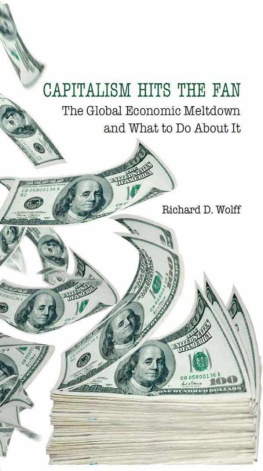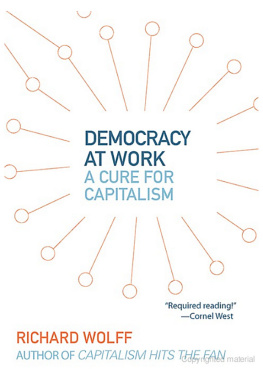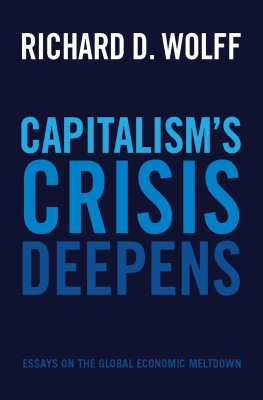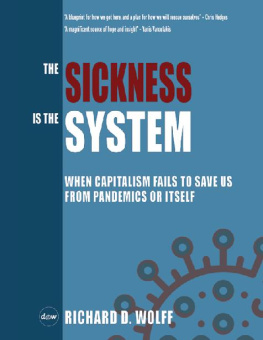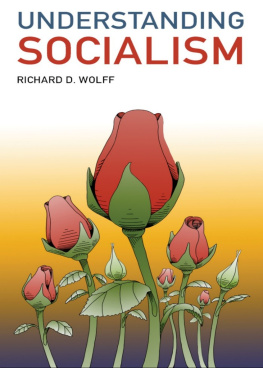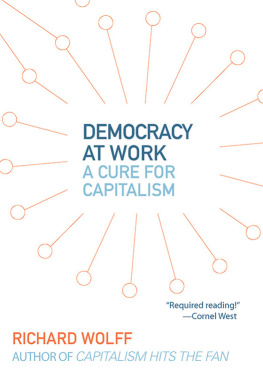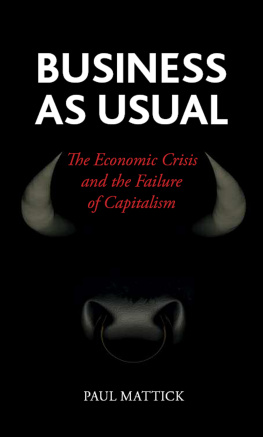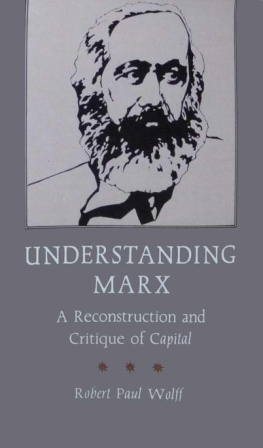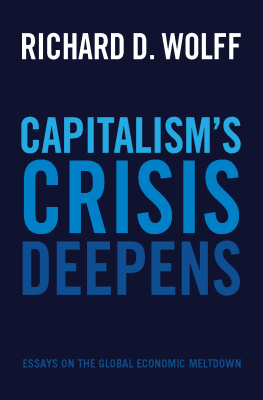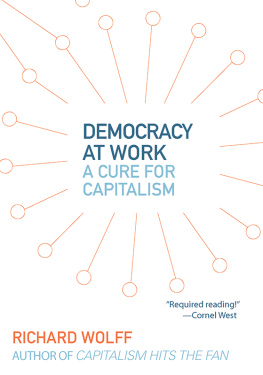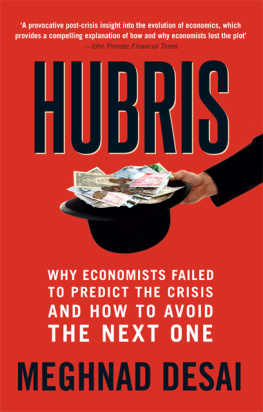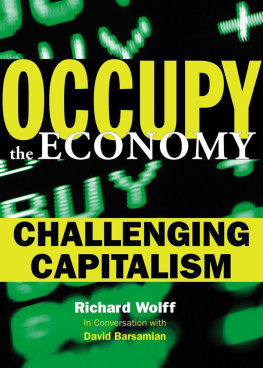

First Published in 2010 by
OLIVE BRANCH PRESS
An imprint of Interlink Publishing Group, Inc.
46 Crosby Street, Northampton, Massachusetts 01060
www.interlinkbooks.com
Copyright Richard D. Wolff, 2010
All rights reserved. No part of this book may be reproduced, stored in a retrieval system or transmitted, in any form or by any means, electronic, electrostatic, magnetic tape, mechanical, photocopying, recording or otherwise, without the prior permission in writing of the publisher.
Library of Congress Cataloging-in-Publication Data Wolff,
Richard D.
Capitalism hits the fan : the global economic meltdown and what to do about it /
by Richard Wolff.1st American ed.
p. cm. Includes index.
ISBN 978-1-56656-784-8 (pbk.)
1. Financial crisesUnited StatesHistory21st century. 2. CapitalismUnited StatesHistory21st century. 3. United StatesEconomic policy2001
I. Title.
HB3722.W64 2009
330.973dc22
2009025488
Cover image Littlemacproductions/dreamstime.com
Printed and bound in the United States of America
To request our complete 48-page full-color catalog, please call us toll free at 1-800-238
LINK, visit our website at www.interlinkbooks.com or write Interlink Publishing, 46
Crosby Street, Northampton, MA 01060
e-mail:
INTRODUCTION
T he world is now suffering the second major crisis of capitalism in 75 years (not to mention the dozen smaller economic downturns in the US alone between the Great Depression of the 1930s and today). The crash that began in 2008 has exploded many beliefs carefully cultivated by academics and massively publicized by business and political leaders via the media subservient to them. The idea that modern capitalism was no longer subject to crashes with devastating social costs is gone. This latest boom gone bust dissolved the myth of a new kind of economy in the US and the UK bringing the world ever-growing wealth by spreading its institutions of private property, multinational corporations, and market freedoms. The notion that government deregulation would free the economy to grow has turned into the desperate hope that massive new government re-regulations and government economic interventions can save capitalism in the US, UK, and beyond from utter collapse.
In short order, the countrys largest insurance company, largest banks, and largest automobile company went bankrupt, in fact if not also legally in each case. Their collapsesand those of many other US corporationsexposed the massive leadership failures of their boards of directors. The US government placed the biggest (the infamous too big to fail crew) on life support with massive infusions of taxpayers money. Obama keeps promising to return them soononce public money and concessions wrung from workers restore their profitabilityback to the control of the same private corporate boards of directors who delivered them into bankruptcy.
Not all economists and others who paid attention to changes in the US economy over recent decades joined in that blindly uncritical celebration of all things capitalistic called mainstream economic analysis. But until the crisis erupted, economic activity plummeted, and millions lost jobs and homes, the critics had few platforms, few opportunities, and thus only marginal influence. However, the magazine Monthly Review, begun with Albert Einsteins help in 1949 and published regularly ever since, kept its critical edge. In 2005 it opened a website to add an electronic magazine to its publications. Shortly thereafter, I began to publish short, topically focused articles there.
They critically analyzed the US political economy that I believed was in deepening danger of collapse. I have published critiques of the US political economy regularly since then. Most of them are collected in this volume. Gradually, after 2005, my writing goals changed. As the crisis loomed, I shifted away from exposing the economic problems and weaknesses that the mainstream celebrants of capitalism always missed or denied. I began to examine the depth, implications, and costs of the crisis to counter the mainstream insistences that the crisis would be averted, then that it would be short and shallow, then that the bottom had been reached, and so on. Finally, when the immensity of the crisis could no longer be hidden or ignored, even by the mainstream, my focus turned to criticism of the solutions proposed by first the Bush and then Obama administrations. Most recently, I have highlighted those solutions not attempted by both administrations. My point is to show why they deserve the discussion, debate, and application that the mainstream avoids in the US, UK, and beyond.
This book offers readers two different services, according to how you read it. The article titles listed in the Contents invite readers to pursue those aspects of this great crisis that interest them most. Teachers seeking to provide students with short, condensed, and readily accessible treatments of those aspects may find many of these articles suitable. At the same time, within each topical section of the book, the individual articles appear in the chronological order of their publication. Reading them in that order allows readers to follow the buildup to crisis, the crash itself, and then the political economy of crisis responses as viewed by a critic of the system. Its a bit like reading a critics diary of the crisis.
Today, the mainstream of academic, business, political, and media leaders mostly celebrates how government programs are solving the crisis just as before it had celebrated capitalism as never needing government intrusion. Democrats have replaced Republicans in Washington; Keynesians have replaced traditional laissez-faire champions; the pendulum that swung rightward after the 1970s is now swinging back to the center. An unreconstructed fundamentalist minority fights the mainstream shift by insisting on the old religion of private enterprise and free markets as if the crisis were a minor blip or maybe even the fault of the demon government.
However, the crisis has so shaken most people that discussion about the economy can no longer be entirely contained and monopolized by the mainstream and the fundamentalists. The issues raised by the crisis go far beyond the stale old debates between those favoring more versus less government. The capitalist system itself has been placed in question. Conservatives inadvertently contributed to this questioning by pasting the label socialist on Obama to reactivate their demoralized base. More importantly, many on the political center-left and left rediscovered the importance and relevance of examining different kinds of socialism as systemic alternatives to a crisis-prone capitalism.
We critics now have an exceptional opportunity. We can develop further an already sizeable audience produced by capitalist crisis. That will depend in large part on our ability to show clearly that the crisis is systemic and that systemic change is among the solutions that should be considered. Books like this aim to make sure that public debate in and over this economic crisis will not be constricted to the narrow contest between more and less government. After all, what hit the fan was global capitalism, a system designed and managed by private enterprises and government working closely together. This books goal is to offer new and compelling arguments for thinking that systemic problems require systemic solutions. The articles elaborate and supplement the core themes of Capitalism Hits the Fan
Next page
